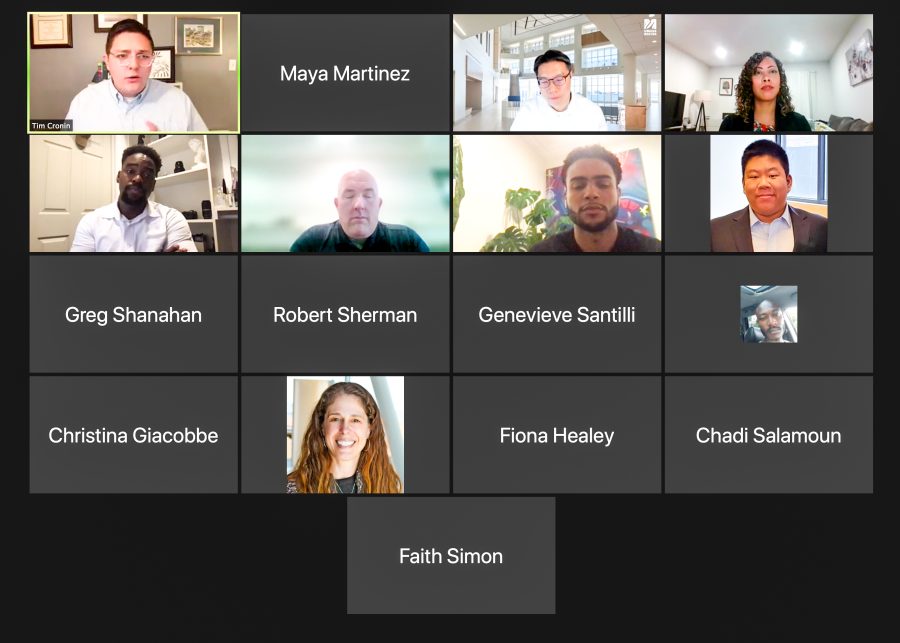On the evening of Thursday, Nov. 18, the McCormack Graduate School’s Department of Public Policy and Public Affairs held a panel on Zoom with UMass Boston MPA students who are masters of public administration practitioners. The panel focused its discussion on how the COVID-19 pandemic impacted their roles in the public sector, and what the public sector could possibly look like in the future.
Hosted by Timothy Cronin, a DPPPA Graduate Assistant and State Director at Climate XChange Massachusetts, the discussion began with an introduction of those on the panel. The panelists included:
Kendy Derival, Employment Coordinator at the Office of the Massachusetts Governor;
Alana Hylton, Program Manager at the Massachusetts Water Resources Authority, Affirmative Action Department;
Luis Morales, Legislative Aide, Massachusetts State Senate;
Patrick Smith, Associate Director at Home Base, a program of Massachusetts General Hospital.
The first half of the discussion included planned questions that were asked to the panelists, including questions about demands placed on public managers, what kind of leadership profiles can be seen moving forward, technology and adapting to working online, working from home and returning to the office, and policies that were put in place during the pandemic and whether or not they will stay in place afterwards. The second half of the discussion was opened up to those in attendance to ask questions to the panel.
One of the first questions of the night was about the kinds of leadership profiles in the public sector that could be seen moving forward, and what managers and leaders in the public sector should do.
Alana Hylton, an MPA-GLPP Student in the Fall 2021 Cohort responded:
“We have to be willing to challenge the organizational culture. I think leaders coming out of this need to be flexible, need to be transparent, need to be innovative. And embracing these new platforms that we’re using. These new ways of doing things that are not traditional.”
COVID-19 brought a lot of challenges, especially with moving employees and offices fully online; it was no different in the Massachusetts legislature and governor’s office.
“I think one of the biggest challenges was that the governor’s office, not just the governor’s office, the whole executive branch, [was] moving; you know this is probably the first time in a while where you have the entire executive branch working remote,” stated Kendy Derival. “It hasn’t happened, at least I’ve never been aware of it. The biggest thing was to transition the entire office to working to being remote and that includes all the employees within the Commonwealth. The second thing, too, that is the adaptations or adjustments to technology.”
Technology was not the only thing that was adapting and adjusting in the public sector. Constituents who needed assistance were faced with difficulties of where to go or how to find information, and Luis Morales spoke to that and his role in all of that.
“My role became primarily focused on unemployment case work. So on a given week between July of 2020 and January of 2021, I had about 20 to 30 constituent cases, in which folks were either delayed in terms of getting their assistance, they were confused as to why there were holds on their accounts, why they were denied, some folks were applying for assistance that they didn’t qualify for. For example, if someone suffered an injury and were on temporary leave, you don’t qualify for unemployment because you have to be willing and able to work, and there’s a separate short-term disability program that’s established for folks like that.”
“So we had folks that were applying, getting assistance in the interim, and when their cases were being investigated and getting flagged, they ended up owing the state tens of thousands of dollars because they were receiving benefits that they didn’t qualify for,” continued Morales. “One way we tried to avoid that from happening was making sure that constituents were well aware of all the resources that were available to them in a one-stop shop. So, we created a one-pager in my office, in terms of all the state agencies that were tasked with assistance and what that did was allow folks to one: learn more about those agencies, what they do, contact us if they needed help and we had that in different languages.”
Like many things that have happened since the start of the pandemic, remote work has become the most common, especially in the public sector. Those working in the public sector had to adapt in order to meet the demands of the public.
“One thing that we learned during the pandemic is that we can have hearings that are equally as effective virtually, so the Senate held housing committee hearings on Zoom and folks would come, provide their testimony, could comment in the chat, raise their hand, and folks got really knowledgeable about how Zoom and all those conferences platforms work, and what I think we’ve learned from it is that it’s a time saver, a money saver, an energy saver, a personnel saver. A saver in so many different ways and I think the legislator will continue virtual briefings even after the pandemic,” stated Morales.
“As far as the future of remote work, I definitely think remote work is the future. I think it’s here to stay,” stated Alana Hylton.

